Stores Near Minsk Were Hit By A Wave Of Experienced Shoppers
30- 4.06.2025, 8:54
- 24,118

They're threatening to sue the sellers.
This interesting type of activity went into the shadows for a while, only to return with a new wave of activity. The gist of it is this: someone has found expired goods in a store, and, in order to avoid a complaint, the sales clerk needs to go to a lecture. Of course, not free: the experienced buyer works for a company that just holds such seminars. The store has avoided punishment from the sanitary station and should be satisfied? But the trade claims: the activity of these "controllers" threatens small stores with big problems, writes "Online".
"Nightmare trade"
The scheme is not new: very attentive customers come to the store and find expired cheese or sour milk - in general, do everything to prevent these products from being caught by you. Such food should not be in the store in principle, and for expiration date should be punished? So at the checkout "controllers" offer the seller to solve the issue peacefully: they will not leave a record in the book of comments and suggestions and will not write to the sanitary station, and the seller in return should come to one or more paid lectures.
Alena says that a similar story happened in a store near Minsk, where she works as a manager. On February twenty-fourth, a man and a woman came to the store, took a bottle of beer and at the cash register said that they found expired goods in the store.
For Alena this is a familiar scenario: the woman says that the last time she encountered such a scenario ten years ago and then because of the pseudo-controllers, "nightmare trade", simply left the grocery sector in general merchandise. As it turned out, during this time experienced buyers have not disappeared anywhere.
Seller Irina, who was on the cash register that day, had not personally encountered them before.
- That day they came to the cash register: "You have overdue goods, give me the book of complaints". It's clear that I was scared and didn't know what to do," Irina says.
- They immediately said: "If we write a complaint, the store will lose its license, because baby food and alcohol are the most painful topics". Of course, they pressured the seller that the license would be revoked," continues Alyona.
- Is it really a revocation?
- No. The first time the sanitation service usually gives a fine. If it is repeated, then much depends on the head doctor.
-Irina assures that the "controller" herself suggested a way out of the situation: the seller signs a contract and buys two lectures for 210 rubles. She claims that she was treated in such a way that she left her signature, although the cost of two lectures is more than half of her salary.
- I work part-time on maternity leave, that is to deduct from my salary of 700 rubles another 420 for lectures - you know what I mean...
Alena says that she came to the store after Irina's call and found out that they didn't even have such beer in their databases, according to the documents it had been sold earlier. Video surveillance also did not help to determine whether this can was in the store or someone could have brought it. According to the manager, the store has a double control over expiration dates: the sellers themselves monitor it, and there is a program that helps to check which items expire.
- Once a week they look at the balance and the terms that will expire in the next 60 days. And we don't have expired goods on the cash register anyway. And the seller did not punch it, they just put a bottle in front of her and said they would write a complaint.
- Is it really that difficult to control expired goods?
- Not all stores have such a system to keep track of balances. "Controllers" actively walk around Minsk district and go to such stores, where there is no possibility, for example, to put a computer to keep track of all this. That is, there are ordinary cash registers there, and people can also overlook it.
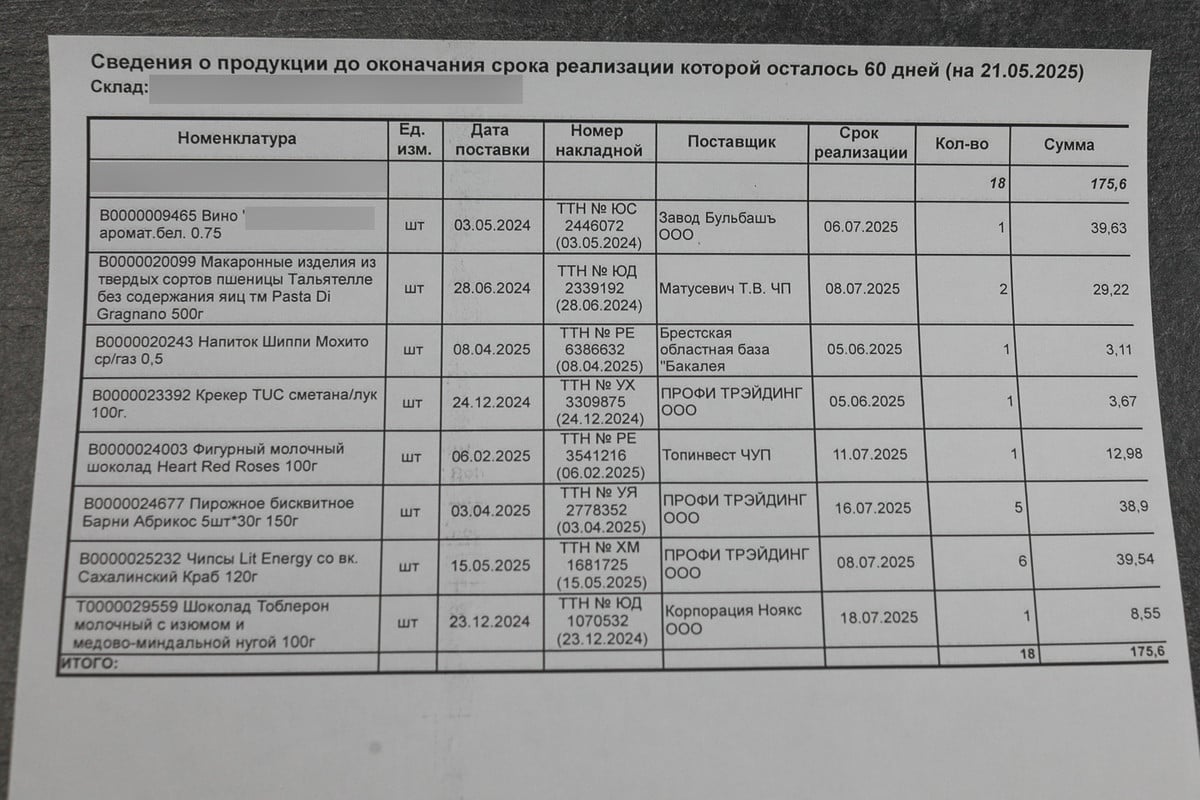
You see, earlier they only went around Minsk. I looked at the periphery and thought: my God, what happy people are that they don't go to them. And now it's the opposite: I called my colleagues in Minsk and asked how they fight with them, and they say that no one goes to them for five years.
"The amount will double"
The seller had to pay for one lecture by March 15, the second - by April 15.
- After the first deadline for payment, the director of this society called me, - says the store manager. - I said we didn't have that beer in stock, so we weren't going to pay for it. She says, "Are you saying I planted it?" I replied that I didn't know where that beer came from.
The director of the society said she would sue, win, and we would have to pay more than the lecture cost.
On April fourth, the woman returned to the store and left a complaint. Alena wrote a reply, but she believes that it was not sent to the sanitary station, otherwise the store would have already been inspected.
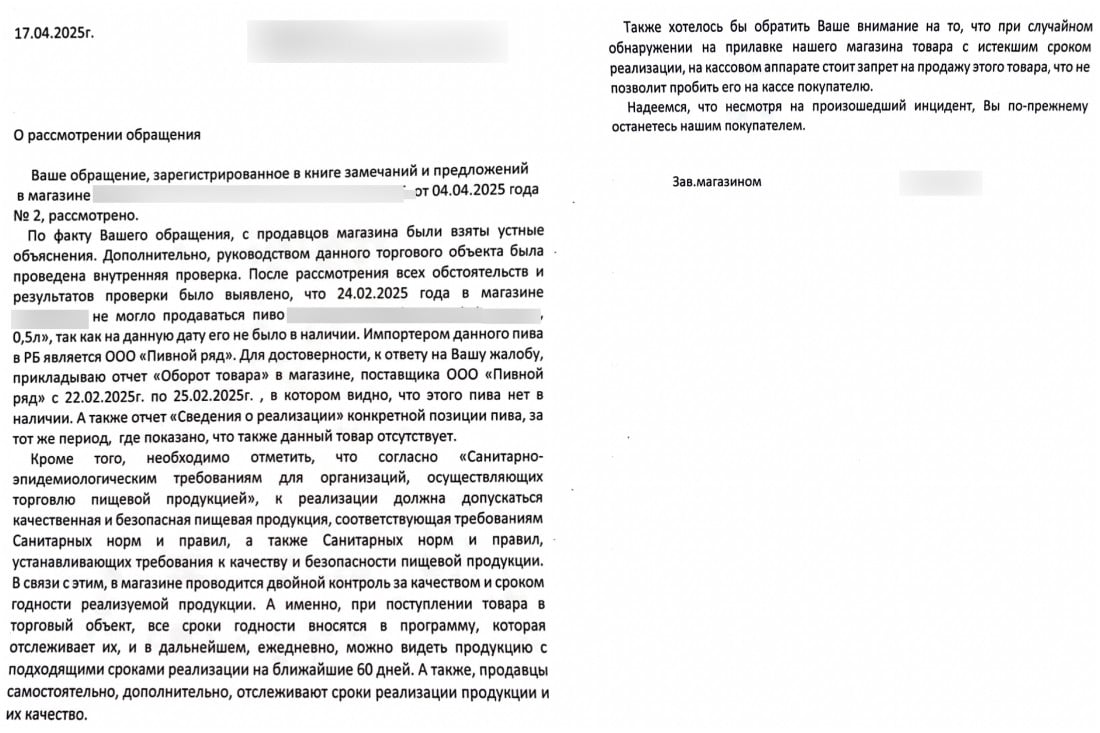
That is, there were no consequences for the store, but the seller received a complaint: it is necessary to pay for the lecture, because there is a contract, or else the court, and the amount of payments can grow twofold.
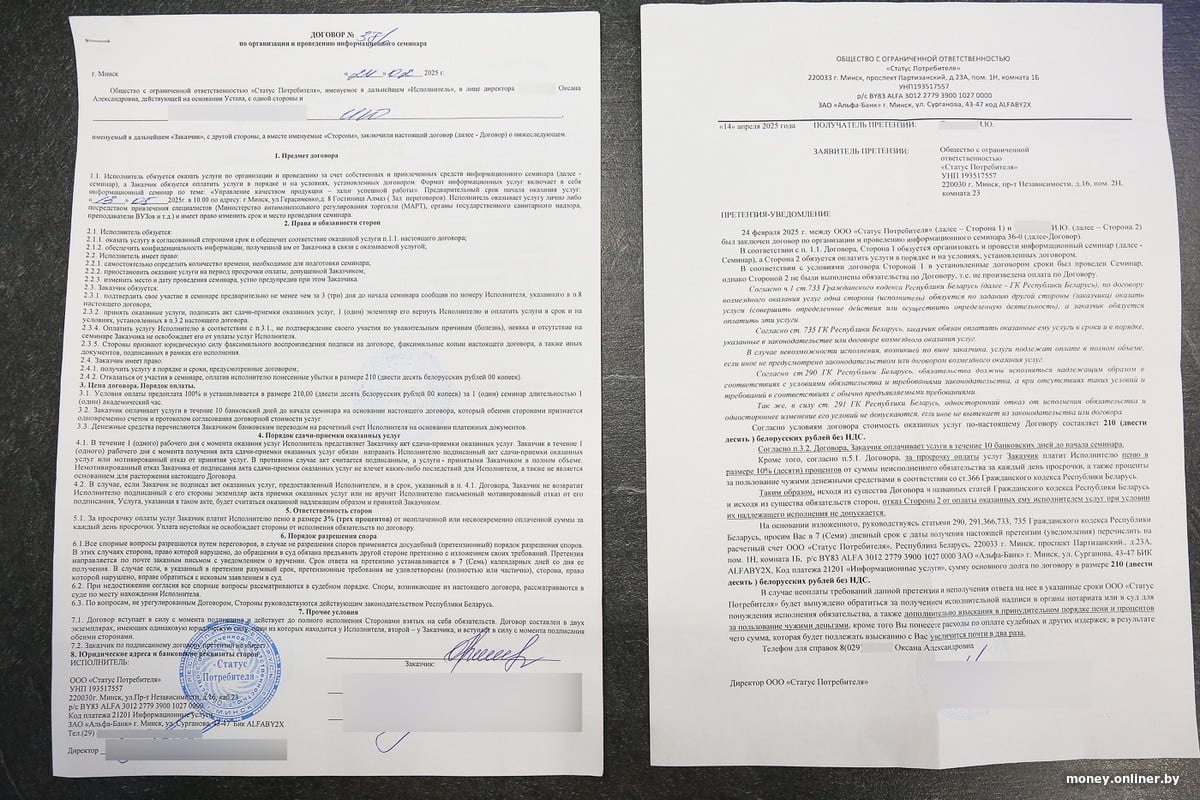
Irina wrote an application to cancel the contract, but it happened after the date on which the lecture was scheduled.
- In these situations, I do not know what is scarier: the blackmail of employees or the fact that such a contract is considered valid. I contacted a lawyer and he said that yes, there have been such courts before. The results were different, but some of the trade workers managed to win.
Irina starts to argue that if she had to pay 50 rubles for a lecture, she would do it, but here the sums are unaffordable for her. The contract states that one lecture from "Consumer Status" costs 210 rubles and lasts for an academic hour, i.e. 45 minutes.

- Even preparation for the CT costs 500 rubles for four months, and there is more than one hour of lessons. What kind of prices are these? - Alena is perplexed.
- How did stores fight with "controllers" before?
- They used to put them in front of a choice: pay for the lecture or complain to the sanitary station. If they didn't get anything, they were sure that the sanitary station would come and the store would be in trouble. Ten years ago, my job ended with writing a response to their complaint, and that was it. But here they have moved to a new level and are suing.
My colleagues in the trade solved the issues in different ways. Some really paid, some refused on principle. It came to everything: managers could even pour expired yogurt on the head of "controllers"...
To work as a "controller", you must not be afraid of God or the devil. I remember ten years ago, one of the inspectors in my office was crying that she was going to leave. She asked: "Let me give you at least one lecture, but I have to do it, you understand". And at the same time she says that her husband asks to quit, because you can't go shopping like that: people will curse.
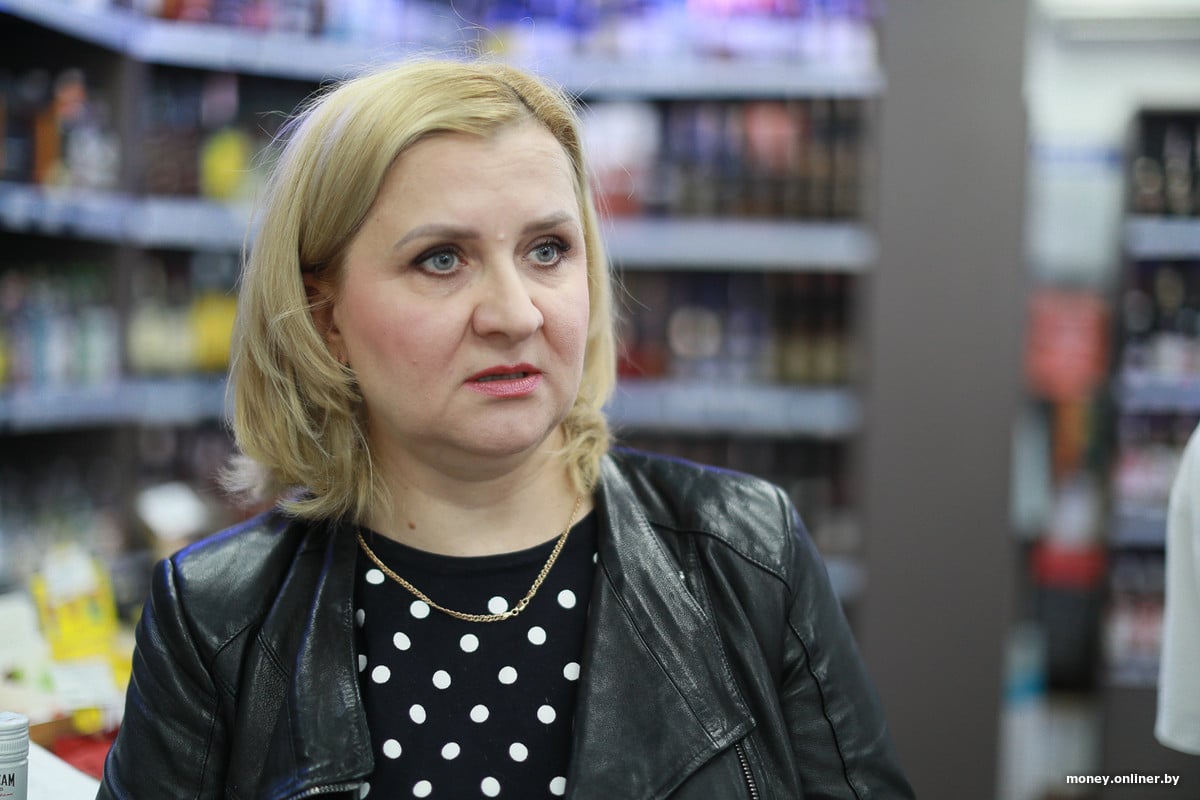
Irina adds that she used to work as a merchandiser, and one of her colleagues also went to work as a "checker" (such structures periodically lure people from the trade).
While we are talking, one of the store owners in Minsk district joins the conversation. He has the same problem: people's "controllers" come purposefully for expired goods and to sell lectures.
- Last time they searched the whole store, found nothing and left with the words "Oh, it's not lucky". How to fight them, it is not clear, because the law can check only authorized government agencies, sanitation, MART, but not these comrades. And we can't expel them from the store.
- How to avoid overdue goods, so that "controllers" would not even think of coming to you?
- In general, I would like to make this point: in any trade object you can find something, even suppliers can bring one thing according to the documents, but in fact the terms are not the same. We ourselves are not interested in selling expired products, otherwise customers will not come to us - this is the most important message.
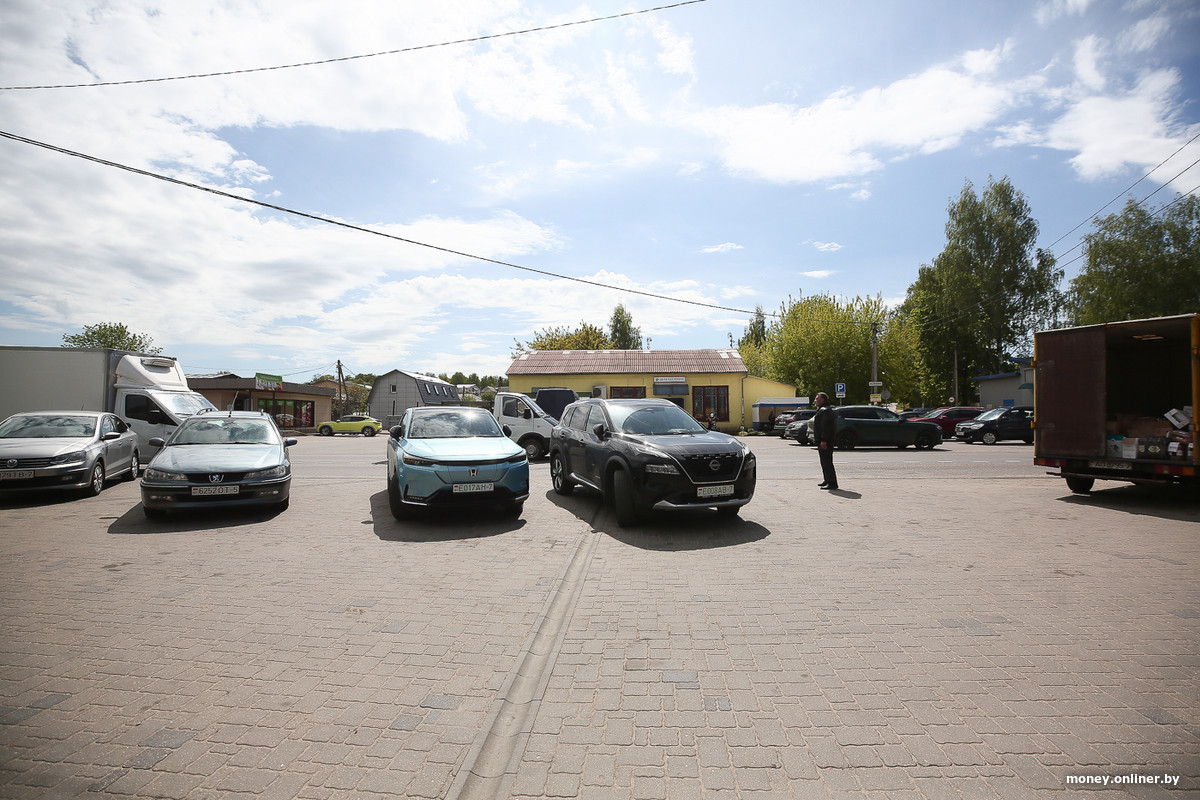
- Some stores say that they already know such "inspectors" by sight.
- No, there are too many of them. Each of them comes about once every three months, and there are many of them, it's not just one company. Minsk district suffers a lot.
What's wrong with these inspections
Public control of stores is prohibited, only authorized bodies can deal with it. Representatives of various legal entities that look for expired goods in stores do not belong to them, LLC is registered under the type of activity not directly related to trade. For example, "provision of other individual services not included in other groupings" - the editorial office has a copy of the contract with the company, which also comes to stores and signs contracts for paid lectures.
Those who have been working in trade for many years say that "controllers" know where to go first of all: in the departments with dairy and bread, where products have the shortest life span. And sellers also pay attention to such a nuance: lectures are sold on behalf of legal entities, but complaints are written on behalf of individuals, that is, formally it is not companies complaining about overdue goods, but as if ordinary consumers.
"Such LLCs are aware that they cannot conduct inspections, so they pretend as if this is just marketing to sell seminars," says one of the trade representatives.
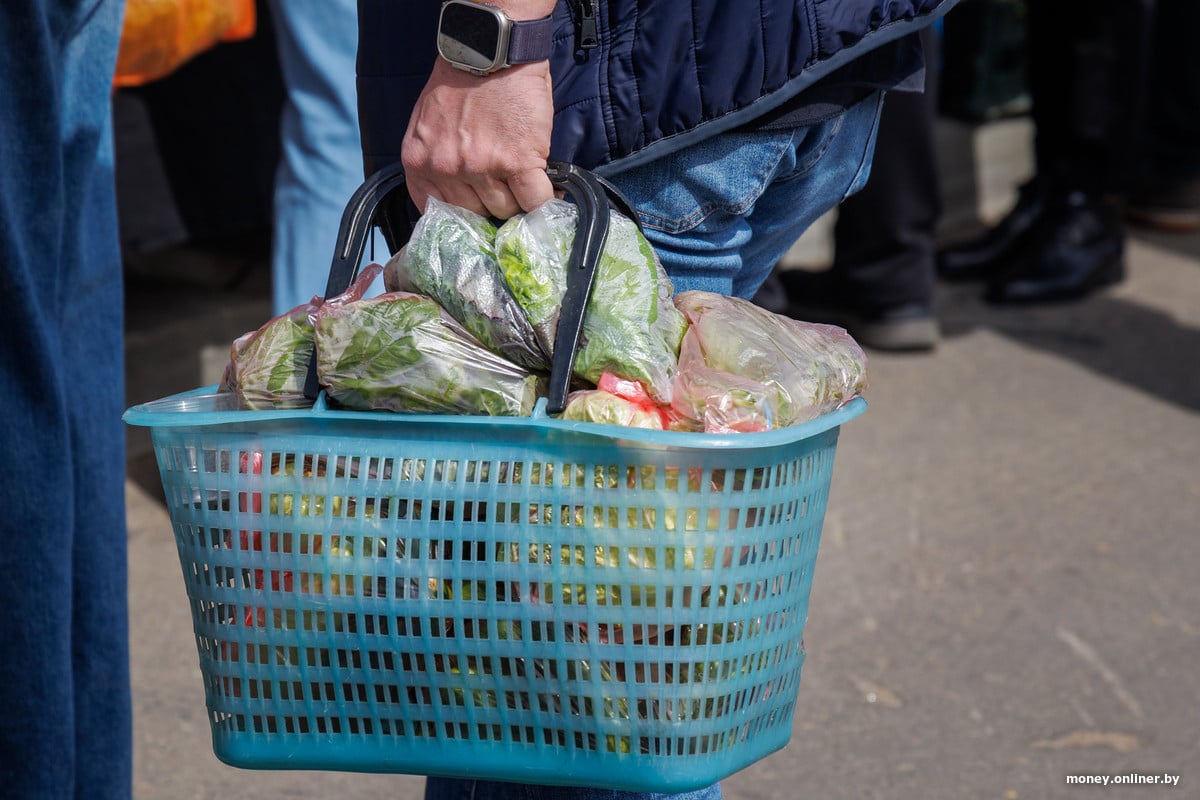
Sometimes such "controllers" get into the news of the police. Thus, in March it became known about the detention of three people who checked Belarusian gas stations, blackmailed the workers and received a large sum of money. If "controllers found violations, they threatened to write a complaint or demanded to buy training seminars on the rules of retail trade," reported the Interior Ministry at the time.
This way, the men received more than a million rubles from gas station employees over several years. A criminal case has been opened for extortion on a particularly large scale - the detainees face up to 15 years in prison.
After the release of this news, the editorial office received dozens of messages from trade workers who also faced persistent salesmen who came to the cash register and talked about violations in the store. The problem was mentioned by sellers both from Minsk and from the regions. Some admitted that they paid for the lectures to avoid problems, others tried to fight, but to no avail.
- We are between a hammer and anvil here: on the one hand, strict internal superiors punish for violations, on the other hand - the sanitary station with considerable fines. Six months ago, we called on the "checking" police, so no one supported us, not a single seller from neighboring outlets did not want to write a statement - no one at all, and it was in their interests too. No, they will suffer and keep silent. The sellers are intimidated, afraid to make a peep. So, after calling the police, we were told by our superiors that there was nothing to raise this issue and next time we will get our heads screwed off.
So what does the company "Consumer Status"
OOO "Consumer Status" was registered on March 5, 2021. Its main activity is other types of education, not included in other groupings. There is practically no information about "Consumer Status" on the Internet - only mentions on services with information about registered legal entities. Also we could not find the company's website or its social media accounts.
We contacted the director of the company, Oksana. At first she told her version of events, but after clarifying questions she refused to talk on the phone and offered to call her back, but after June 20 (the conversation took place on May 29, the record is available in the editorial office).
She said that there were five expired bottles of beer in the store, and when the seller called the head of the store, she herself asked to send the seller to a seminar, because she feared repercussions from higher management.
The director described the activities of "Consumer Status" as collecting information about expired products and offering seminars on a paid basis.
When asked how exactly listeners for paid seminars are sought (only in stores with expired products or not), the director stated that "I can offer people on the street, too." How they determine those who need to attend the seminar on the street, the director did not explain and decided to stop the conversation: there are too many questions, and it is better to ask them after June 20.
In fact, there are even more questions. How many of these seminars has the organization sold? Why did they choose to come to stores to sell lectures and why did they bring expired goods to the cash register? How many salespeople have been charged through the courts? What knowledge does a 45-minute seminar that costs 210 rubles provide? So far they are unanswered, but "Consumer Status" can tell about its work without waiting until the end of June.
Can I refuse the seminar?
Even if the contract is signed, it can be canceled, but it is not so easy.
As explained by lawyer Tatiana Revinskaya, paragraph 2 of Article 735 of the Civil Code provides that if the provision of services is impossible through the fault of the customer, the services must be paid in full, unless otherwise provided for by law or the contract for the provision of services.
The lawyer notes that the contract concluded between the parties contains a condition that the customer (i.e. in this case the seller) undertakes to confirm its participation in the seminar in advance at least three days before the seminar by telephone (paragraph 2.3.1), as well as to pay for the service to the performer, while failure to confirm his participation for valid reasons (illness), non-appearance and absence at the seminar does not exempt the customer from payment for services (paragraph 2.3.4).
- Based on these conditions, "Consumer Status" Ltd. made a claim to the seller for reimbursement of the cost of services, and with reference to clause 5.1 of the contract pointed to the recovery of penalties in case of non-payment of the cost of services (the contract stipulates such liability at the rate of 3%, while the claim states 10% - there is a discrepancy here. - Onlíner note).
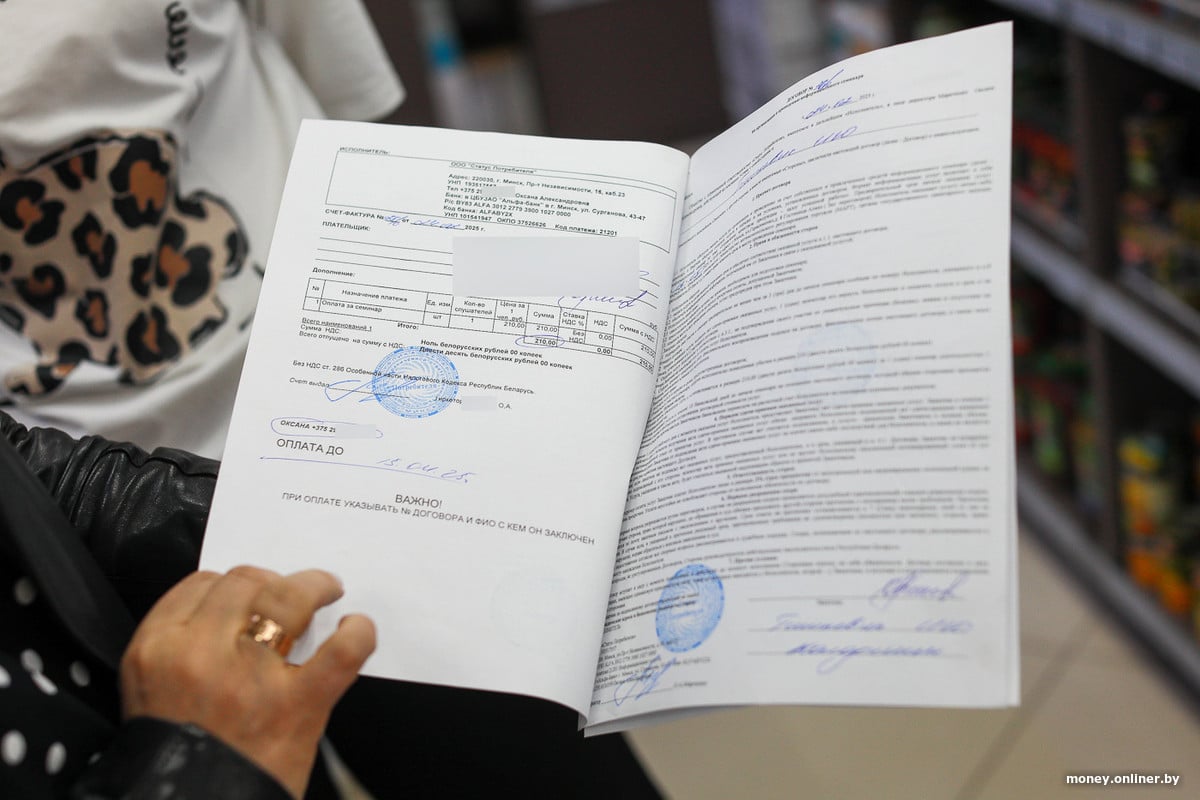
Tatiana Revinskaya notes that in this case the LLC and the seller entered into a contract of paid services. By virtue of Article 736 of the Civil Code, it may be terminated unilaterally by either party. But the seller did not use this right until the date of fulfillment of its obligations by the LLC (the date of the seminar).
- Taking into account the specific situation, if the dispute is still to be resolved in court, the seller has the right to make a claim for invalidation of the concluded agreement - as concluded under the influence of misconception, providing the relevant evidence.
The lawyer also draws attention to the fact that the parties to the contract have the right to determine its terms and conditions in the manner and within the limits provided by the law When considering such cases, the courts take into account the fact that citizens and legal entities are free to conclude a contract, and the terms of the contract are determined at the discretion of the parties in the manner and within the limits provided by law (Article 391 of the Civil Code).











